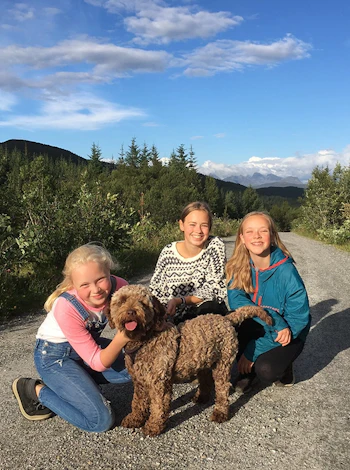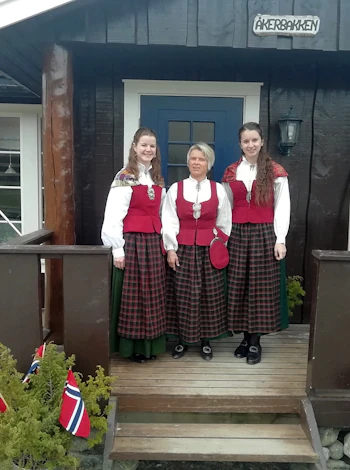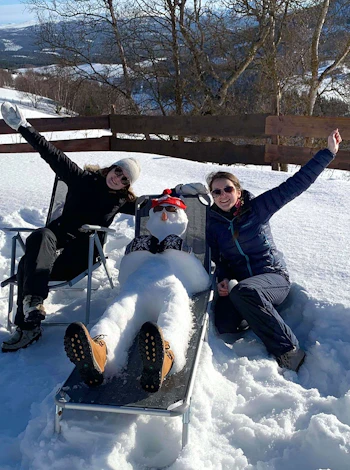High school exchange program
in Norway
Live the life of a Norwegian teenager, gaining a second family and studying at a local high school for a semester or a year.














Experience true life in the land of fjords
Student exchange program in Norway
Europe's northernmost country, Norway, is known to enjoy one of the world's highest standards of living. Thanks to a safe and stable environment, an advanced political system and excellent healthcare, education and welfare services, Norway's bustling urban centres are just as enjoyable as its remote, quaint villages.
In Norway, you will find unspoilt landscapes and unique natural wonders, making this a true paradise for the lovers of nature and the big outdoors. Its peaceful national parks, soaring mountains and majestic fjords are the ideal setting for all sorts of activities: cross-country, skiing, snowboarding, ice fishing, trekking... and have we mentioned the incredible phenomenon of the Midnight Sun, or the awe-inspiring Northern Lights? Get ready to be blown away!

Experience the Nordic majesty
Aurora borealis
The north of Norway is one of the best places in the world to witness the magic of the Northern Lights, a collision of atoms that releases flashes of coloured lights in the night sky. This creates a spectacular show you will never forget.
What’s high school like in Norway?
Mutual support
Norwegian students are always ready to help their classmates. Don't hesitate to ask them for input or assistance, and to do the same with anyone who seems to be in need of support.
Two ways of seeing the world
While Norwegian is the official language, locals are also fluent in English. You will experience new ways of studying English at school, and new ways of seeing the world through different lenses.
Having fun is important
Extra-curricular activities are a big part of Norwegian schooling, with various initiatives, sports, excursions and outdoor activities to choose from. There will be plenty of opportunities to get involved outside of the classroom!
Teaching autonomy
You may be surprised by how much freedom Norwegian students are afforded. In fact, autonomy is strongly valued in Norway and students are encouraged to take charge of their own learning and become active participants in their education.
Unlock the Nordic way of life on your exchange program
Choose authenticity – trust WEP and prepare to be amazed.
On a WEP Classic program, you will experience the most authentic side of Norway. You may be placed anywhere in the country, depending on the location of the host family who has chosen you to share this incredible adventure with.
Volunteer host family
Public school
Placement anywhere in Norway
Semester or year programs available
Your host family during your exchange year
Gain a second family – they can’t wait to welcome you into their lives!
Here is why:
At first, Norwegians can come across as calm and shy individuals. Speaking to strangers, or greeting people on the street, is quite rare: it is simply the Norwegian way of being kind. You will soon realise they have their own unique way of being loving and hospitable.
Norwegian families highly value equality, irrespective of gender, age or social class. Respect for others and inclusion are also very important, which means you will be welcomed into their family 'as you are' and you'll feel included right away.
As the saying goes, "Norwegians are born with skis on their feet"! Norwegians love to get out and about, catch up with friends, spend time in the mountains or at the seaside, follow sport on TV and play sports, too. Get ready for lots of new experiences!



Your school in Norway
Find out more about your school experience
Education in Norway includes the whole period from kindergarten to higher education, however schooling is compulsory for children aged 6 to 15.
Students attend primary school (barneskole) from 6 to 12 years old, then go to middle school (Ungdomsskole) until they're 15. At 16 years of age, students begin secondary school (Videregående skole), which is not compulsory, for three years. At the age of 18 or 19, students who have obtained a high school diploma can continue with tertiary education.
The Norwegian education system
Different schools in specific areas may offer different programs and subjects. The core subjects common to all secondary schools include: Norwegian, English, a second foreign language, history, geography and mathematics.
During the last two years of secondary school, students can choose three elective subjects. Some of the most common electives are English literature, phylosophy, chemistry, biology e physics. In vocational schools, students complete practical internships instead of studying electives.
Many schools offer bilingual programs, with all subjects taught in English as well as Norwegian.
Subjects in Norway
Norwegian secondary schools can be of two types: Studiespesialisering, which offers a general program aimed at preparing students for further education, and Yrkesfag, which is similar to vocational and technical schools.
Students spend three years in secondary school, consisting of:
* Grade 10 (16-17 years old)
* Grade 11 (17-18 years old)
* Grade 12 (18-19 years old)
Secondary schooling
Extra-curricular activities in Norwegian schools are many and varied. Activities are organised through clubs formed at the beginning of the academic year, however they can also be built into standard classes, making school a dynamic and interactive experience.
For example, classroom learning is often complemented by outdoor activities, live performances, excursions and school camps financed by the school itself, to guarantee all students have access to equal opportunities.
Extra-curricular activities
The Norwegian academic year is split in two terms. The first term (autumn) starts in the second half of August until Christmas, with a one-week break in October.
The second term (spring) often starts on January 2nd and goes all the way to mid-June, with a break for the winter holidays and a break for Easter. Summer holidays last approximately two months.
School hours vary depending on several factors: the geographical area of the school, the subjects chosen, and the school itself. Therefore, each student tends to have their own schedule, but generally speaking, the day starts between 8:00-9:30 am and ends between 2:00-3:30 pm, including a one-hour lunch break.
Classes are typically 1:30 hours long, including 15 minutes for students to get to the next classroom before the following period starts.
The school calendar
The Norwegian grading system is based on a scale from 1 to 6. The passing grade is 3, which is also the minimum average required to gain access to most universities; however, some of the most prestigious institutions require higher marks.
At the end of secondary school, Norwegian students sit a national exam called Eksamen fra videregående opplæring. The exam includes a Norwegian language and literature test, as well as a test on one or several subjects taken during the last year of school.
Grading system in Norway
Stories from students and parents who have been there
Here are the testimonials of families who have chosen WEP for their exchange experience.
Going with WEP is best
Since 1988, a wide choice of destinations and comprehensive assistance before, during and after your overseas program. WEP is the ideal partner for your big overseas adventure.
Like you, we also get to choose who we travel with: our schools, host families and overseas partner organisations are carefully selected.
We offer a custom-made insurance policy, specifically designed for our participants, and we have a solid network behind us.
Emergency assistance, overseas and from Australia, is available 7 days out of 7, 24 hours a day, 365 days a year.
Allowing all our participants to live their desired overseas experience is a mission, a challenge we're thrilled to accept.
FAQ
Your host family, local coordinator and your host organisation will provide you with support while you are overseas. WEP Australia will remain in contact with the host organisation and your parents to coordinate and support your experience. In case of an emergency, both you and your family will be able to call an emergency phone number that is answered 24/7.
You will be advised of your placement location, host family and host school as soon as feasible. This can range from a few months prior to departure, right up until departure, as a lot needs to happen behind the scenes before each student's placement process is complete and can be communicated to you with certainty. The placement process doesn't only include sourcing a suitable host family, but also finding availability at a local school, and completing all red tape (including, for example, lenghty criminal history checks in some countries). Prior to departure from Australia, all students will receive host family, host school and local coordinator details.
Independent travel is not permissible while on exchange. However, you will be able to travel with your host family, school, host organisation and other community groups such as sporting teams or scouts. Again, the foremost aim of the program is educational, and your priority for any holiday periods must be your host family, who will be investing a lot of time, energy and money into this experience - simply in return for your frienship and positive contribution to their household.
Generally speaking, overseas schools won't issue a diploma to exchange students who are only there for a short time and don't graduate at that school. You may however be provided with a honorary certificate, as well as a WEP certificate of completion, which however don't count towards credit or graduation in Australia.
Language experience is desirable, but not necessary, for most countries. However, some countries have mandatory language requirements. You'll find the specific requirements for each country listed on its page. Intensive language courses may, in some circumstances, meet language pre-requisites. WEP strongly recommends language preparation prior to departure as language knowledge is of enormous benefit in assisting you to quickly adapt to your new family, school and life.
Of course, there are English-speaking destinations available if you are not interested in learning another language.
No, it's the host families who choose the student they wish to invite into their home. Based on the documents you will submit as part of your WEP application, one lucky family will choose to open their home and hearts to you, which is why for all Exchange Classic programs, and many Flex programs as well, there is no avenue for students to choose a specific location.
It may be possible to live with an overseas family that you already know (excluding relatives of the student). However, the family will have to be screened and approved, prepared and supported by our partner organisation in the same manner as any other host family. School enrolment must also be available.
More questions?

